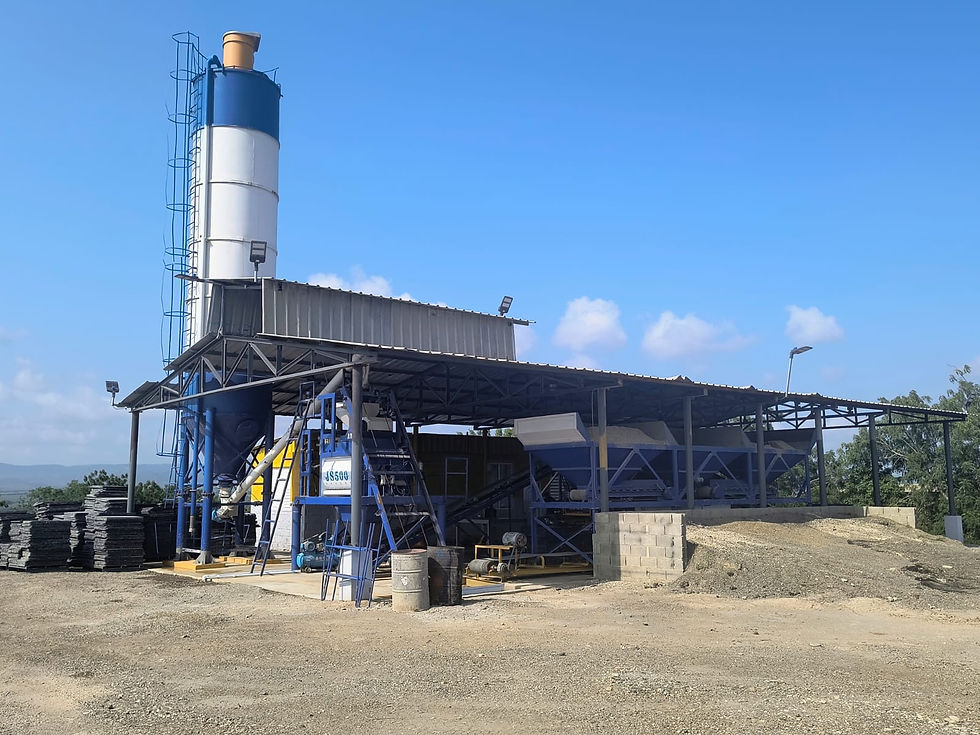How the Mini Concrete Batching Plant Market Is Evolving Globally
- aimixglobal5
- May 18, 2025
- 4 min read
The global construction industry is undergoing rapid transformation, driven by urbanization, infrastructure development, and evolving project demands. Within this dynamic environment, the mini concrete batching plant segment is experiencing notable growth and innovation. These compact, efficient systems are increasingly favored by contractors, small to medium enterprises, and emerging markets seeking flexibility without sacrificing quality.
In this article, we explore how the mini concrete batching plant market is evolving globally and what this means for buyers searching for a reliable concrete plant for sale.

Rising Demand from Emerging and Urban Markets
One of the most significant factors driving the global mini concrete batching plant market is rapid urbanization, particularly in Asia, Africa, and Latin America. Cities are expanding vertically and horizontally, requiring concrete production solutions that are versatile and scalable.
Unlike traditional large-scale batching plants, mini concrete batching plants are designed for smaller projects, tighter spaces, and easier relocation. This makes them ideal for:
Urban residential developments
Small commercial buildings
Rural infrastructure projects
Renovation and repair works
Governments’ increased investment in roads, schools, and public utilities in developing countries has also created a surge in demand. Many contractors prefer owning or leasing a mini concrete batching plant rather than relying on expensive, inconsistent ready-mix deliveries.
Cost Efficiency and Accessibility
Cost considerations are central to the growing popularity of mini batching plants. For new entrants and small contractors, the price point is much more accessible compared to full-sized plants, making it easier to start or expand operations.
The availability of affordable concrete plant for sale models tailored to different budgets and capacities enables more players to enter the concrete production sector. Additionally, mini plants typically consume less power, require smaller setups, and have lower maintenance costs.
This affordability, combined with growing construction demand worldwide, has led to the proliferation of mini concrete batching plants in local markets, especially where large-scale plants are impractical.
Technological Advancements Fueling Market Growth
Technological innovation plays a crucial role in shaping the mini concrete batching plant market. Recent developments have improved the efficiency, automation, and environmental friendliness of these plants.
Automation: Many mini plants now come equipped with semi-automatic or fully automatic control systems that streamline mixing, reduce human error, and improve batch consistency.
Modular design: Mini plants are increasingly modular, allowing faster assembly, disassembly, and transport between sites. This is essential for contractors working on multiple short-term projects.
Energy efficiency: Newer models incorporate energy-saving motors and mixers, minimizing operational costs and environmental impact.
Dust suppression and water recycling: Features that reduce emissions and water usage are becoming standard, aligning with global sustainability goals.
These innovations are making mini concrete batching plants competitive with larger plants in quality, while maintaining their traditional advantages of size and flexibility.

Growing Popularity of Mobile Mini Concrete Batching Plants
Among the evolving types of mini concrete batching plants, mobile variants are gaining momentum. The mobile concrete batching plant combines compact size with mobility, enabling on-site concrete production with minimal setup time.
Mobile mini plants benefit contractors who need quick deployment in remote or urban job sites. The ability to relocate easily translates into operational savings, increased project control, and fresher concrete batches.
As technology advances, mobile mini plants are becoming more robust, with improved mixers, control systems, and aggregate handling capabilities. This trend is expected to accelerate the global market, as more contractors value the convenience of mobility.
Regional Market Highlights
Asia-Pacific
The Asia-Pacific region is the largest and fastest-growing market for mini concrete batching plants. Countries like China, India, Indonesia, and Vietnam are witnessing rapid urbanization and infrastructure investment, creating fertile ground for mini plant sales.
Many manufacturers from China dominate this sector by offering affordable, high-quality concrete plant for sale options. Local contractors prefer mini batching plants for their cost-effectiveness and adaptability to dense urban environments.
Africa
In Africa, the mini concrete batching plant market is expanding due to infrastructure projects and housing demands. The mobility and affordability of mini plants make them suitable for the continent’s diverse construction needs, especially in rural areas where large plants are impractical.
Europe and North America
While these mature markets traditionally favor larger stationary plants, mini concrete batching plants are carving out niches for small contractors and specialized projects. Enhanced automation and sustainability features appeal to European buyers focused on environmental compliance.
Challenges in the Mini Concrete Batching Plant Market
Despite strong growth, the mini concrete batching plant market faces some challenges:
Quality variations: The affordability of mini plants sometimes comes with trade-offs in quality and durability, leading to shorter lifespans or higher maintenance.
Competition: A crowded market with many manufacturers requires buyers to carefully evaluate suppliers and technical specifications.
Skilled labor: In some regions, operators may lack the training to maximize the efficiency and longevity of mini batching plants.
Addressing these challenges requires investments in quality control, after-sales support, and operator training programs.
How to Choose the Right Mini Concrete Batching Plant for Sale
When selecting a mini concrete batching plant for sale, buyers should consider:
Production capacity suited to project needs
Automation level for ease of use and consistency
Mobility and modularity for project flexibility
Energy consumption and environmental features
Manufacturer reputation and after-sales service
Proper evaluation helps ensure that the plant delivers reliable performance and long-term value.

Conclusion
The global mini concrete batching plant market is evolving rapidly, driven by urbanization, infrastructure development, and technological progress. With increased demand for flexible, cost-effective, and efficient concrete production solutions, mini batching plants are becoming indispensable tools for contractors worldwide.
For anyone searching for a concrete plant for sale, understanding these market dynamics and innovations is crucial to making an informed investment. Whether for small urban projects or remote infrastructure works, mini concrete batching plants represent a smart, scalable solution for today’s construction challenges.




Comments